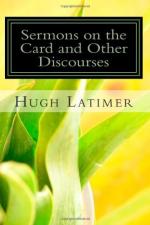Now you have heard, that to these divers offences of ire and killing be appointed punishments according to their degrees: for look as the offence is, so shall the pain be: if the offence be great, the pain shall be according; if it be less, there shall be less pain for it. I would not now that you should think, because that here are but three degrees of punishment spoken of, that there be no more in hell. No doubt Christ spake of no more here but of these three degrees of punishment, thinking they were sufficient, enough for example, whereby we might understand that there be as divers and many pains as there be offences: and so by these three offences, and these three punishments, all other offences and punishments may be compared with another. Yet I would satisfy your minds further in these three terms, of “judgment, council, and hell-fire.” Whereas you might say, What was the cause that Christ declared more the pains of hell by these terms than by any other terms? I told you afore that he knew well to whom he spake them. These terms were natural and well known amongst the Jews and the Pharisees: wherefore Christ taught them with their own terms, to the intent they might understand the better his doctrine. And these terms may be likened unto three terms which we have common and usual amongst us, that is to say, the sessions of inquirance, the sessions of deliverance, and the execution-day. Sessions of inquirance is like unto judgment; for when sessions of inquiry is, then the judges cause twelve men to give verdict of the felon’s crime, whereby he shall be judged to be indicted: sessions of deliverance is much like council; for at sessions of deliverance the judges go among themselves to council, to determine sentence against the felon: execution-day is to be compared unto hell-fire; for the Jews had amongst themselves a place of execution, named “hell-fire:” and surely when a man goeth to his death, it is the greatest pain in this world. Wherefore you may see that there are degrees in these our terms, as there be in those terms.




